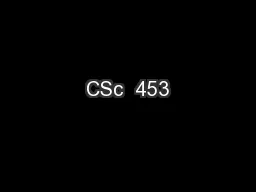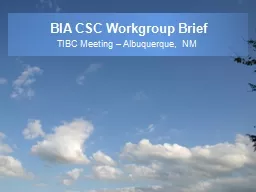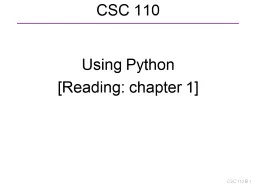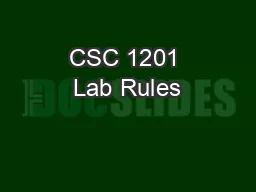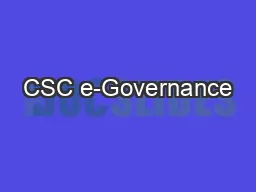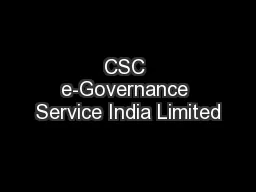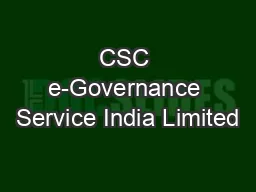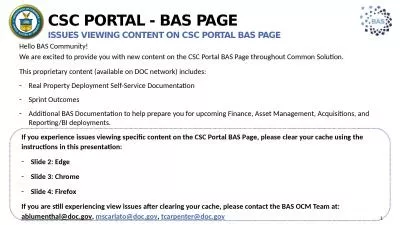PDF-Science CSC 400
Author : emily | Published Date : 2021-09-29
Computer Operating SystemsCredits and Contact Hours 3 Credits Contact Hours 42 1 contact hour 50 minutesInstructor Dr Brian KruppTextbook Modern Operating Systems
Presentation Embed Code
Download Presentation
Download Presentation The PPT/PDF document "Science CSC 400" is the property of its rightful owner. Permission is granted to download and print the materials on this website for personal, non-commercial use only, and to display it on your personal computer provided you do not modify the materials and that you retain all copyright notices contained in the materials. By downloading content from our website, you accept the terms of this agreement.
Science CSC 400: Transcript
Computer Operating SystemsCredits and Contact Hours 3 Credits Contact Hours 42 1 contact hour 50 minutesInstructor Dr Brian KruppTextbook Modern Operating Systems Tanenbaum 4th EditionCourse Descript. yahoocomqsNTTOdt brPage 6br 40 CGI CSC309 11 40 CGI CSC309 12 AUTHTYPE CONTENTLENGTH CONTENTTYPE GATEWAYINTERFACE PATHINFO PATHTRANSLATED QUERYSTRING REMOTEADDR REMOTEHOST REMOTEIDENT REMOTEUSER REQUESTMETHOD SCRIPTNAME SERVERNAME SERVERPORT SERVER CSC 372, Spring 2015. The University of . Arizona. William H. Mitchell. whm@cs. CSC 372 Spring 2015, Haskell Slide . 1. Programming Paradigms. CSC 372 Spring 2015, Haskell Slide . 2. Thomas Kuhn's . The Structure of Scientific Revolutions. Compilers & Systems Software. Saumya Debray. The University of Arizona. Tucson, AZ 85721. CSc 453: Background. 2. Course Objectives. Understand the design and implementation of compilers and related systems software.. TIBC Meeting – Albuquerque, NM. Why change the Contract Support Cost (CSC) Policy?. The CSC Policy was only supposed to remain in effect for 12 months.. Anything that is scheduled to remain in effect over 12 months needs to be incorporated into an Indian Affairs Manual (IAM) Chapter.. Defining functions. [Reading. : chapter . 6]. CSC 110 G . 1. Objectives. To understand why programmers divide programs up into sets of cooperating functions.. To be able to define new functions in Python.. Writing simple programs. [Reading: chapter 2]. CSC 110 C . 1. Objectives. To be able to understand and write Python statements to . output information to the screen, . assign values to variables, . get numeric information entered from the keyboard, . & . WFP E-Card (electronic voucher). Bekaa. Valley, Lebanon. 5 November 2013. Explaining the 2 card system. Type of cash assistance. Purpose, amount, . donor(s. ). Identifying features: How to tell the cards apart. Nouf Aljaffan (C) 2012 - CSC 1201 Course at KSU. Warning. Lab and . tutorial. work requires your attendance. It is . not a group work. therefore you must study before the class time to be able to finish the required assignments or tutorial. . Service India Limited. VLE . Registration Process. To . access any of the services available by CSC, VLEs need to . register. . himself/herself on . apna. . csc. portal by following the registration Process. Recharge . Services. VLE can use online recharge services available on . apna. CSC portal. Recharges services are. available for following categories & companies;. 1.. . Mobile Recharge. Aircel. CSC . Bazaar. CSCs can sell products through this online e-commerce portal enabled through . Infibeam. .. Further CSCs can also open its own online store for free and sell local products through. it. The product can be delivered to the customer either at the CSC Location where the order. July 23, 2014. Always open to new ideas and suggestions. Workgroup Members. Primary . Tribal . Representatives. . Tribe (BIA Region). . Phone. Amy Fredeen. Cook Inlet (Alaska). 907-793-3431. Patty LeBlanc. Hello BAS Community!. We are excited to provide you with new content on the CSC Portal BAS Page throughout Common Solution. . This proprietary content (available on DOC network) includes: . Real Property Deployment Self-Service Documentation . Get complete detail on MO-400 exam guide to crack Microsoft Outlook Associate (Office 2019). You can collect all information on MO-400 tutorial, practice test, books, study material, exam questions, and syllabus. Firm your knowledge on Microsoft Outlook Associate (Office 2019) and get ready to crack MO-400 certification. Explore all information on MO-400 exam with number of questions, passing percentage and time duration to complete test.
Download Document
Here is the link to download the presentation.
"Science CSC 400"The content belongs to its owner. You may download and print it for personal use, without modification, and keep all copyright notices. By downloading, you agree to these terms.
Related Documents



